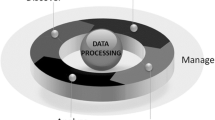Abstract
Process analytics techniques such as process discovery play an important role in mining event data and providing organizations with insights about the behaviour of their deployed processes. In many practical settings, process log data is often geographically dispersed, may contain information that may be deemed sensitive and may be subject to compliance obligations that prevent this data from being transmitted to sites distinct to the site where the data was generated. Traditional process mining techniques operate by assuming that all relevant available process data is available in a single repository. However, anonymising, giving control access and safely transferring sensitive data across organization/site boundaries while preserving priacy guarantees is non-trivial. In this paper, we lay out the first steps for a federated future for process analytics where organizations routinely collaborate to learn and mine geographically dispersed process-related data.
Access this chapter
Tax calculation will be finalised at checkout
Purchases are for personal use only
Similar content being viewed by others
References
Acs, G., Castelluccia, C.: Dream: Differentially private smart metering. arXiv preprint arXiv:1201.2531 (2012)
Augusto, A., et al.: Automated discovery of process models from event logs: review and benchmark. IEEE Trans. Knowl. Data Eng. 31(4), 686–705 (2018)
Balle, B., Wang, Y.X.: Improving the gaussian mechanism for differential privacy: analytical calibration and optimal denoising. In: International Conference on Machine Learning, pp. 394–403. PMLR (2018)
Bonawitz, K., et al.: Towards federated learning at scale: System design. arXiv preprint arXiv:1902.01046 (2019)
Bonawitz, K., et al.: Practical secure aggregation for federated learning on user-held data. arXiv preprint arXiv:1611.04482 (2016)
Bonawitz, K., et al.: Practical secure aggregation for privacy-preserving machine learning. In: proceedings of the 2017 ACM SIGSAC Conference on Computer and Communications Security, pp. 1175–1191 (2017)
Clifton, C., Kantarcioglu, M., Vaidya, J., Lin, X., Zhu, M.Y.: Tools for privacy preserving distributed data mining. ACM Sigkdd Explorations Newsletter 4(2), 28–34 (2002)
Dunkl, R., Fröschl, K.A., Grossmann, W., Rinderle-Ma, S.: Assessing medical treatment compliance based on formal process modeling. In: Holzinger, A., Simonic, K.-M. (eds.) USAB 2011. LNCS, vol. 7058, pp. 533–546. Springer, Heidelberg (2011). https://doi.org/10.1007/978-3-642-25364-5_37
Dwork, C., Kenthapadi, K., McSherry, F., Mironov, I., Naor, M.: Our data, ourselves: privacy via distributed noise generation. In: Vaudenay, S. (ed.) EUROCRYPT 2006. LNCS, vol. 4004, pp. 486–503. Springer, Heidelberg (2006). https://doi.org/10.1007/11761679_29
Dwork, C., McSherry, F., Nissim, K., Smith, A.: Calibrating noise to sensitivity in private data analysis. In: Halevi, S., Rabin, T. (eds.) TCC 2006. LNCS, vol. 3876, pp. 265–284. Springer, Heidelberg (2006). https://doi.org/10.1007/11681878_14
Dwork, C., Roth, A., et al.: The algorithmic foundations of differential privacy. Found. Trends Theor. Comput. Sci. 9(3–4), 211–407 (2014)
Evans, D., Kolesnikov, V., Rosulek, M.: A pragmatic introduction to secure multi-party computation. Foundations and Trends® in Privacy and Security, vol. 2, no. 2–3 (2017)
Goldreich, O., Micali, S., Wigderson, A.: How to play any mental game, or a completeness theorem for protocols with honest majority. In: Providing Sound Foundations for Cryptography: On the Work of Shafi Goldwasser and Silvio Micali, pp. 307–328 (2019)
Jensen, P.B., Jensen, L.J., Brunak, S.: Mining electronic health records: towards better research applications and clinical care. Nat. Rev. Genet. 13(6), 395–405 (2012)
Kairouz, P., Liu, Z., Steinke, T.: The distributed discrete gaussian mechanism for federated learning with secure aggregation. arXiv preprint arXiv:2102.06387 (2021)
Kairouz, P., et al.: Advances and open problems in federated learning. arXiv preprint arXiv:1912.04977 (2019)
Konečnỳ, J., McMahan, H.B., Ramage, D., Richtárik, P.: Federated optimization: Distributed machine learning for on-device intelligence. arXiv preprint arXiv:1610.02527 (2016)
Lang, M., Bürkle, T., Laumann, S., Prokosch, H.U.: Process mining for clinical workflows: challenges and current limitations. In: MIE, vol. 136, pp. 229–234 (2008)
Lenz, R., Reichert, M.: It support for healthcare processes-premises, challenges, perspectives. Data Knowl. Eng. 61(1), 39–58 (2007)
McSherry, F., Talwar, K.: Mechanism design via differential privacy. In: 48th Annual IEEE Symposium on Foundations of Computer Science (FOCS’07), pp. 94–103. IEEE (2007)
Ramage, D.: Federated analytics: Collaborative data science without data collection (2020). https://ai.googleblog.com/2020/05/federated-analytics-collaborative-data.html
So, J., Güler, B., Avestimehr, A.S.: Turbo-aggregate: breaking the quadratic aggregation barrier in secure federated learning. IEEE J. Selected Areas Inform. Theor. 2(1), 479–489 (2021)
Weijters, A., van Der Aalst, W.M., De Medeiros, A.A.: Process mining with the heuristics miner-algorithm. Technische Universiteit Eindhoven, Technical report, WP, vol. 166, pp. 1–34 (2006)
Weijters, A., Ribeiro, J.T.S.: Flexible heuristics miner (fhm). In: 2011 IEEE Symposium on Computational Intelligence and Data Mining (CIDM), pp. 310–317. IEEE (2011)
Yang, Q., Liu, Y., Chen, T., Tong, Y.: Federated machine learning: concept and applications. ACM Transactions on Intelligent Systems and Technology (TIST) 10(2), 1–19 (2019)
Zhu, W., Kairouz, P., McMahan, B., Sun, H., Li, W.: Federated heavy hitters discovery with differential privacy. In: International Conference on Artificial Intelligence and Statistics, pp. 3837–3847. PMLR (2020)
Author information
Authors and Affiliations
Corresponding author
Editor information
Editors and Affiliations
Rights and permissions
Copyright information
© 2021 Springer Nature Switzerland AG
About this paper
Cite this paper
Khan, A., Ghose, A., Dam, H. (2021). Cross-Silo Process Mining with Federated Learning. In: Hacid, H., Kao, O., Mecella, M., Moha, N., Paik, Hy. (eds) Service-Oriented Computing. ICSOC 2021. Lecture Notes in Computer Science(), vol 13121. Springer, Cham. https://doi.org/10.1007/978-3-030-91431-8_38
Download citation
DOI: https://doi.org/10.1007/978-3-030-91431-8_38
Published:
Publisher Name: Springer, Cham
Print ISBN: 978-3-030-91430-1
Online ISBN: 978-3-030-91431-8
eBook Packages: Computer ScienceComputer Science (R0)



